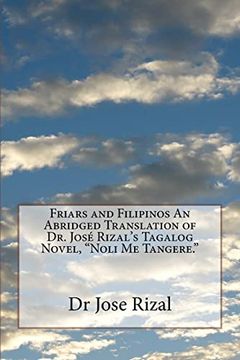Friars and Filipinos an Abridged Translation of dr. José Rizal’S Tagalog Novel, “Noli me Tangere. ” (in English)
Synopsis "Friars and Filipinos an Abridged Translation of dr. José Rizal’S Tagalog Novel, “Noli me Tangere. ” (in English)"
While serving on the staff of the first United States Commission to the Philippine Islands my attention was called to the life and writings of Dr. José Rizal. I found in his novel, "Noli Me Tangere," the best picture of the life of the people of those islands under Spanish rule, and the clearest exposition of the governmental problems which Spain failed to solve, and with which our own people must deal. It occurred to me that an English translation of Rizal's work would be of great value at the present time. My first intention was to reproduce the entire novel as it was written, but, after careful consideration, I thought best to abridge the story by the omission of some parts which did not seem essential to the main purpose of the work. The present volume is the result. Readers should not understand any of Rizal's references to priests and friars as reflections upon the Roman Catholic Church. He was throughout his life an ardent Catholic, and died a firm adherent of the Church. But he objected to the religious orders in the Philippine Islands, because he knew well that they were more zealous in furthering their own selfish ends than in seeking the advancement of Christianity. From experience, Dr. Rizal knew that the friars, under cloak of the gospel ministry, oppressed his fellow countrymen, and took advantage of their superstition and ignorance. These wrongs he was brave enough to expose in his writings. In the friars he saw an obstacle to the education and enlightenment of the Filipino people, and, using moderate means, he did his utmost to secure reform. His writings will explain to us the cause of the hatred shown by the Filipinos toward the religious corporations, and will make clearer the nature of one of the present problems in the Philippines. There are in the Philippines five religious orders: the Dominicans, Franciscans, Recoletos, Augustines and Jesuits. According to John Foreman, an eminent authority, the members of all of these, except the last named, come from the lower classes in Spain, and are on the whole comparatively ignorant and uncultured. Under the Spanish system of government certain provinces were assigned to each of the orders-except the Jesuits-and the friars were distributed among the different parishes. In the town assigned to him the friar had much authority. He was chief adviser in all civil affairs, and, by his influence over the superstitious natives, maintained absolute control in all matters pertaining to the local government as well as to the local church. So firm was his hold that he led the Spanish government to believe that the islands could not be ruled without his aid. Knowing that his power rested on the ignorance of the people he discouraged education among them. When native Filipinos advanced so far as to prove an obstacle to the religious orders, as did Rizal and many others, the friars sought to destroy them. Forgetting their holy mission, the religious orders became commercial corporations, amassed enormous wealth, and gained possession of the most valuable parts of the islands, though to much of this property the titles are not clear. From my own observation, and from information derived from the Spaniards themselves, I am convinced that the author has not overdrawn his pictures. In fact I have learned of instances where the oppression and practices of the friars were even worse than those described. Dr. Rizal has given us a portrayal of the Filipino character from the viewpoint of the most advanced Filipino. He brings out many facts that are pertinent to present-day questions, showing especially the Malayan ideas of vengeance, which will put great difficulties in the way of the pacifying of the islands by our forces. The reader will not fail to notice the striking similarity between the life of Ibarra, the hero, and that of Rizal, the author, a short sketch of whose career has been given in the following pages. (snipped) F. E. G. Ithaca, N. Y., Dec. 1, 1900.

